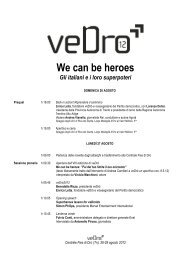democracy - Vision the Italian Think Tank
democracy - Vision the Italian Think Tank
democracy - Vision the Italian Think Tank
Create successful ePaper yourself
Turn your PDF publications into a flip-book with our unique Google optimized e-Paper software.
Iraq). The vote was “obviously” not divisible and incapable to articulate opinions soto register disapproval for handling of economics and a specific encouragement on<strong>the</strong> war to terror.For sure, we are not suggesting to have a system by which it may happen that two(<strong>the</strong>oretically a number of <strong>the</strong>m equal to <strong>the</strong> number of policies) presidents may beelected according to <strong>the</strong> relative strength of candidates on different issues. And yet itis difficult to accept that a ra<strong>the</strong>r rich set of opinions (and thus of information, ofpersonal experience and sometimes of individual know how) that an individualexpress has to collapse to a single vote; and even less acceptable that large pieces ofpolicies (large as <strong>the</strong> decision of moving a war or increasing public deficit) do,practically, go not accountable to citizens or at least <strong>the</strong>y are bundled in a muchlarger and thus ra<strong>the</strong>r into very meaningful feedback. We still may have one presidentand one premier but it is increasingly less acceptable not to have some form ofaccountability on some specific policies or even for <strong>the</strong> responsible (being <strong>the</strong>mministers or secretary of state or assessors) of <strong>the</strong>ir implementation.We are not questioning <strong>the</strong>n <strong>the</strong> validity of <strong>the</strong> existence of a “general” election. Anysystem does need to have somebody who is in charge of establishing prioritiesamong different policies and different public services. However, <strong>the</strong> point is that onceagain, <strong>democracy</strong> cannot be based solely on moments (more or less cathartic) ofgeneral elections.In a certain sense, if <strong>the</strong> “federalism” interprets <strong>the</strong> real need for greater participationmoving power vertically to general institutions on lower levels (regions, town halls),<strong>the</strong> next democratisation phase could be one where power are instead re allocatedhorizontally still at <strong>the</strong> same level but towards specialized policy makers 30 .Market researches do reflect this type of articulation. People are asked not only tovote (this is, in fact, not even one of <strong>the</strong> most popular polls), but to express personal(almost a sort of consumer’s) satisfaction by question (security, jobs, immigration,family, ..). And it is <strong>the</strong> never ending demand for polls that points to citizens’ formore “informative” mechanisms. In a sense, <strong>the</strong> possibility that we are discussing isto construct a process that is able to reflect in a legitimate way feedbacks provided insome regulated fashion.As said before, however, to change electoral processes imply a change in <strong>the</strong>institutions and <strong>the</strong> way government operates. This makes <strong>the</strong> entire exercise muchmore fundamental and difficult than <strong>the</strong> one that some e-<strong>democracy</strong> experiments haveattempted.30 This is, in fact, what already happens with <strong>the</strong> multiplication of “agencies” which do work ra<strong>the</strong>r well, and yet are notaccountable to any body but <strong>the</strong> general institution that rented to <strong>the</strong>m decision making capabilities.32





